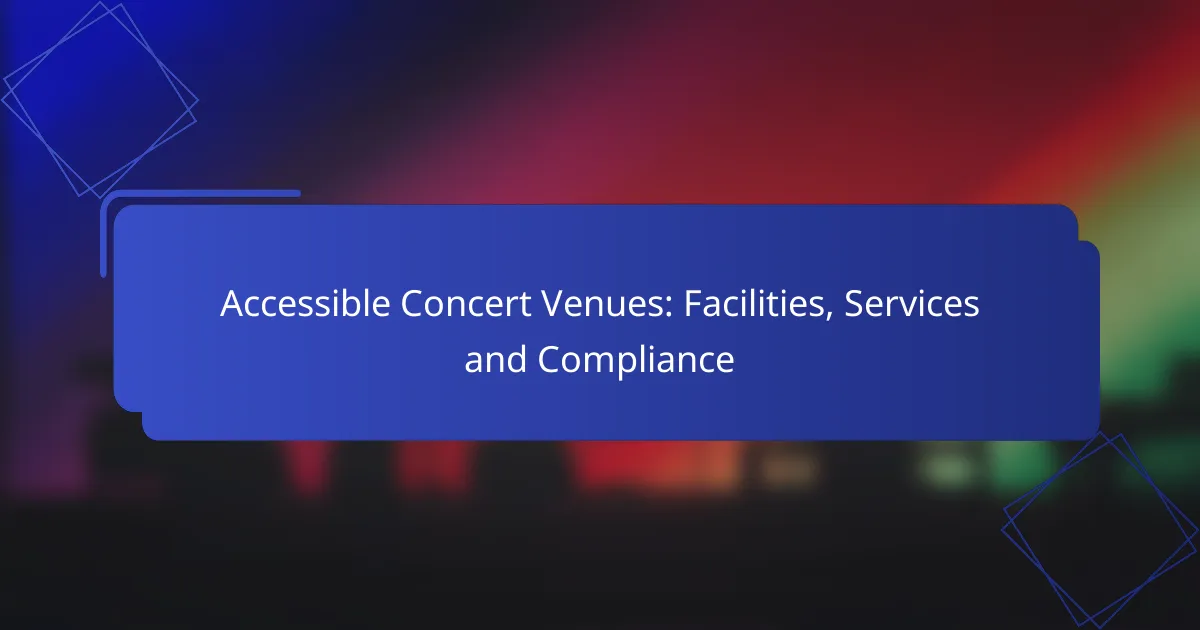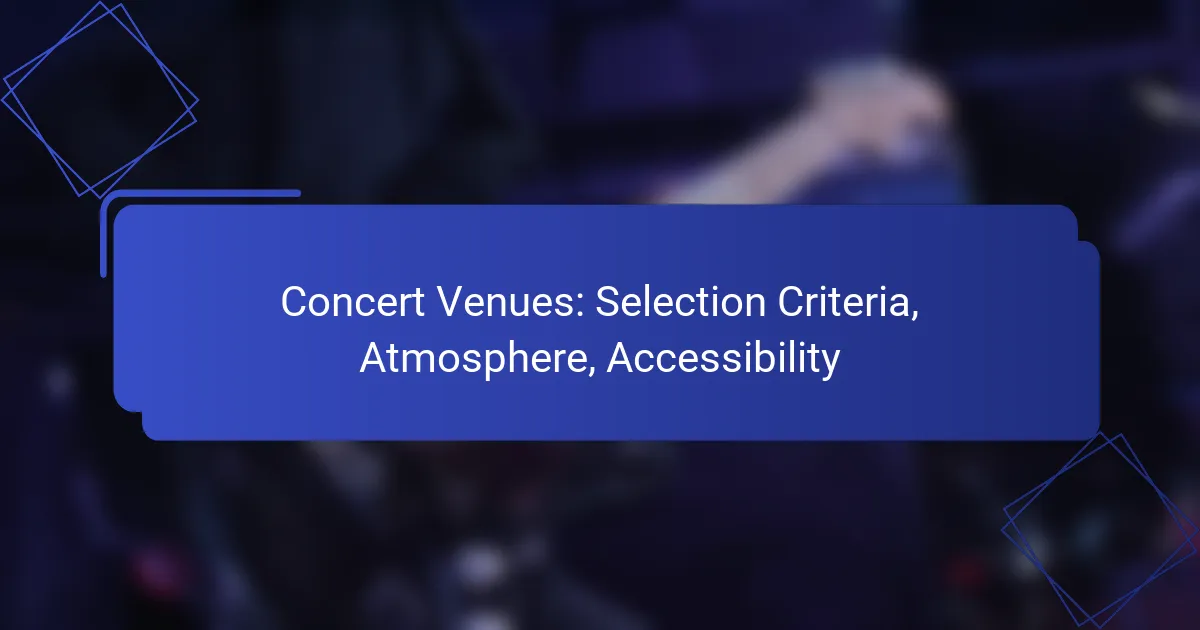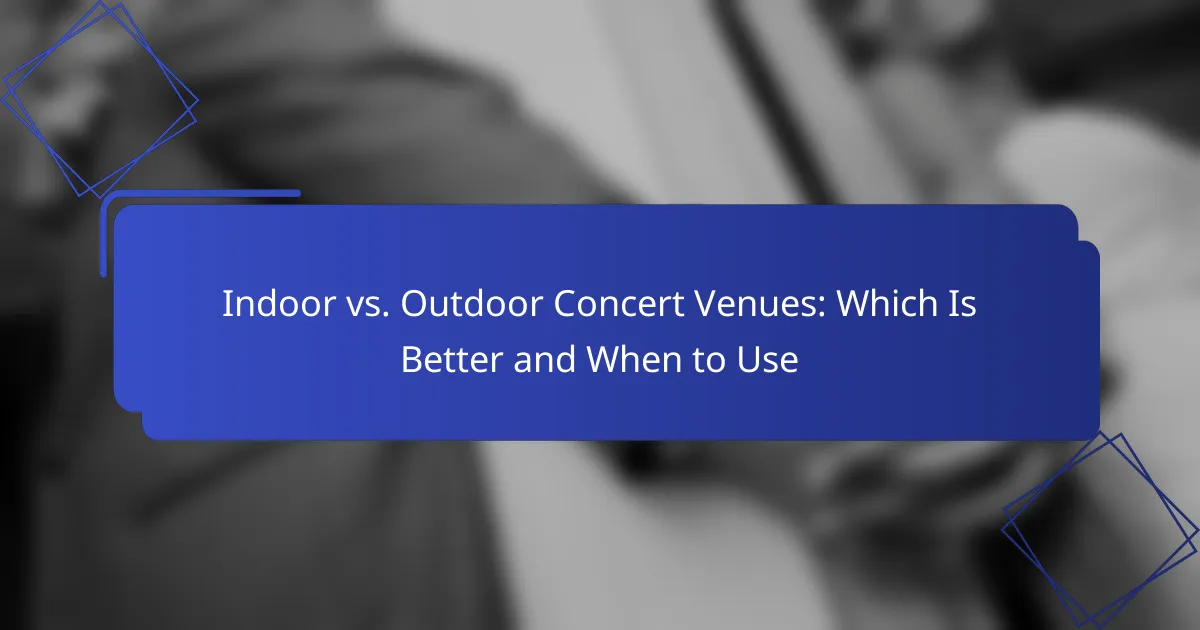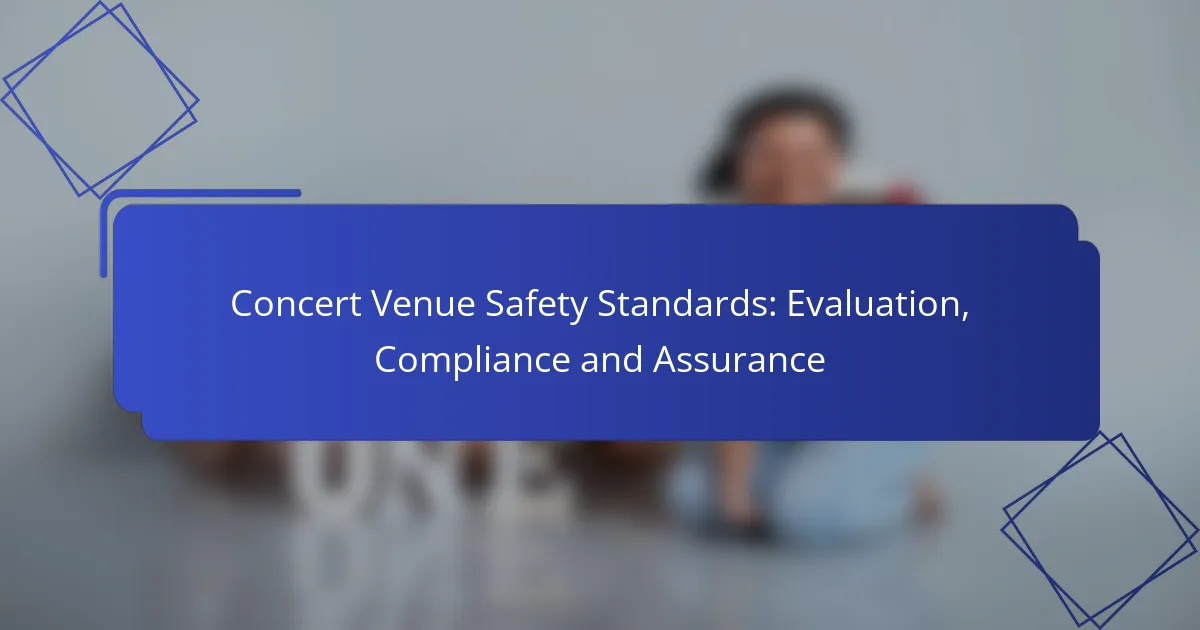Accessible concert venues play a crucial role in ensuring that individuals with disabilities can fully enjoy live performances. In cities like New York, venues such as Madison Square Garden and Barclays Center are equipped with essential facilities and services, including assistive listening devices and personal assistance, to create an inclusive environment for all attendees.
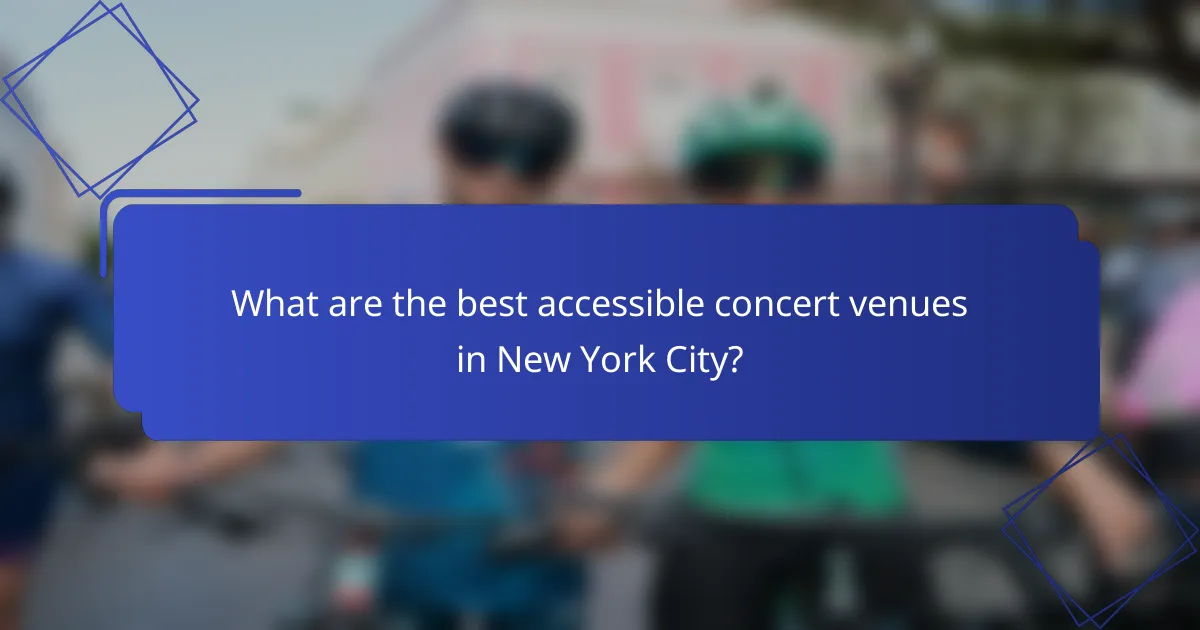
What are the best accessible concert venues in New York City?
New York City boasts several concert venues that prioritize accessibility, ensuring that all attendees can enjoy performances without barriers. Key venues like Madison Square Garden, Barclays Center, and Brooklyn Academy of Music offer a range of facilities and services tailored to individuals with disabilities.
Madison Square Garden
Madison Square Garden is renowned for its commitment to accessibility, featuring designated seating areas for individuals with mobility challenges. The venue provides accessible restrooms, elevators, and assistive listening devices to enhance the concert experience.
When attending an event, it’s advisable to purchase tickets in advance through their accessible seating options. Staff members are trained to assist guests with disabilities, ensuring a smooth entry and exit process.
Barclays Center
Barclays Center offers a variety of accessible services, including wheelchair-accessible seating and companion seating options. The venue is equipped with ramps, elevators, and accessible restrooms, making it easy for all guests to navigate the space.
For those requiring additional assistance, Barclays Center encourages patrons to contact guest services prior to their visit. This proactive approach can help ensure that any specific needs are accommodated during the event.
Brooklyn Academy of Music
The Brooklyn Academy of Music (BAM) is dedicated to providing an inclusive environment for all attendees. The venue features accessible seating, assistive listening devices, and sensory-friendly performances for individuals with sensory sensitivities.
Visitors should check BAM’s website for detailed information on accessibility options for specific events. It’s recommended to arrive early to familiarize yourself with the venue layout and available services, ensuring a comfortable experience.
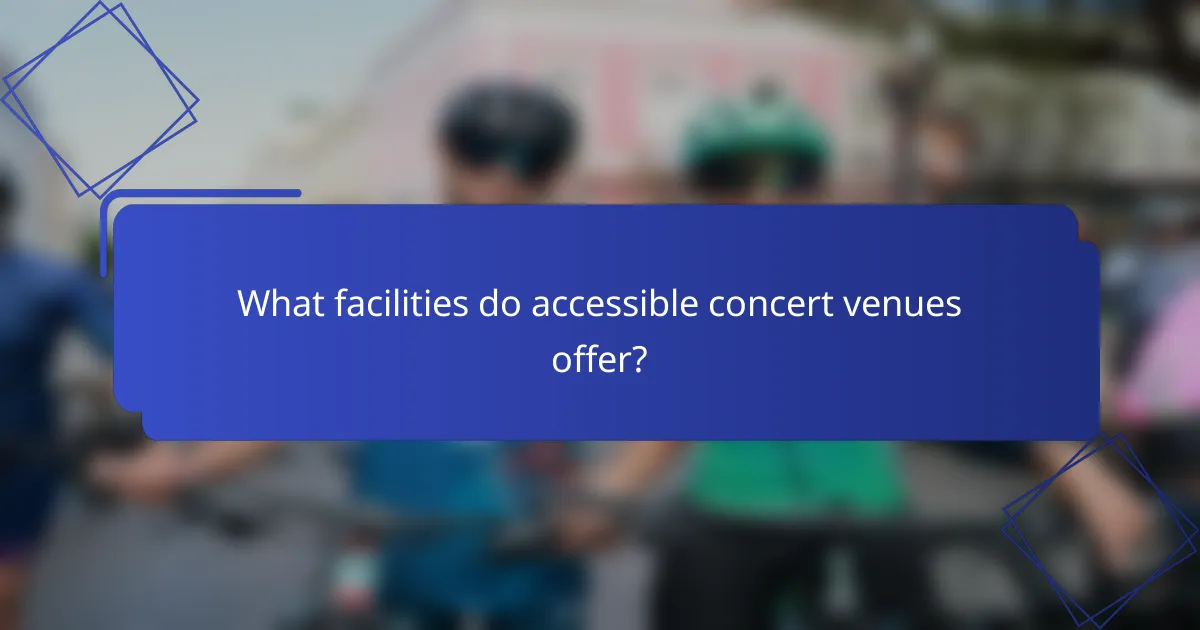
What facilities do accessible concert venues offer?
Accessible concert venues provide a range of facilities designed to accommodate individuals with disabilities. These features ensure that everyone can enjoy performances comfortably and safely, enhancing the overall concert experience.
Wheelchair access
Wheelchair access is a fundamental aspect of accessible concert venues. This includes ramps, elevators, and designated entrances that allow easy entry and exit for individuals using wheelchairs. Venues should ensure that pathways are clear and wide enough to accommodate various mobility aids.
When attending a concert, check for the availability of accessible parking spaces close to the venue entrance. It’s also beneficial to confirm that the seating areas are designed to allow wheelchair users to enjoy the performance without obstruction.
Accessible seating options
Accessible seating options are crucial for providing a comfortable experience for patrons with disabilities. Venues typically offer designated seating areas that are spacious and positioned for optimal viewing of the stage. These seats are often located near aisles for easy access.
When purchasing tickets, inquire about accessible seating arrangements and any companion seating options available. Some venues may offer discounted rates for individuals with disabilities or their companions, so it’s worth asking about these possibilities.
Restroom accessibility
Restroom accessibility is an essential facility in concert venues, ensuring that all attendees can use the facilities comfortably. Accessible restrooms should be equipped with features such as grab bars, wider stalls, and lower sinks to accommodate individuals with mobility challenges.
Before attending an event, check the venue’s website or contact their customer service to confirm the number and location of accessible restrooms. It’s also advisable to arrive early to avoid long lines, especially during intermissions or before the concert starts.
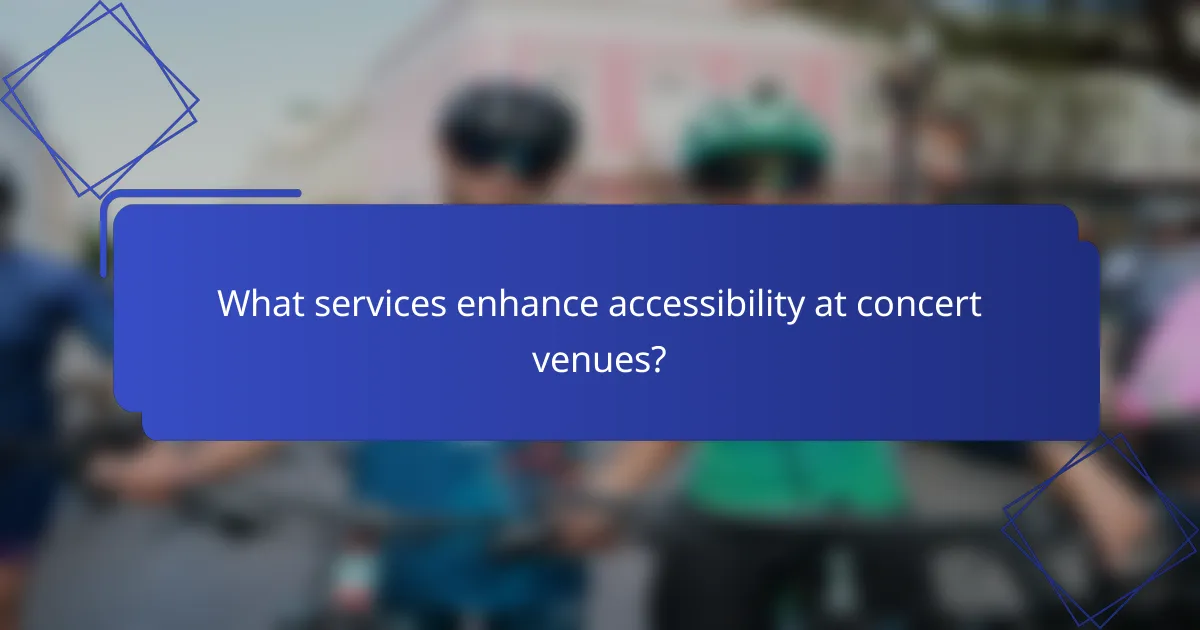
What services enhance accessibility at concert venues?
Concert venues enhance accessibility through various services designed to accommodate individuals with disabilities. These services include assistive listening devices, sign language interpretation, and personal assistance services, ensuring a more inclusive experience for all attendees.
Assistive listening devices
Assistive listening devices (ALDs) improve sound quality for individuals with hearing impairments. These devices can include FM systems, infrared systems, and induction loop systems, which transmit sound directly to hearing aids or headsets.
When selecting a venue, check if they provide ALDs and whether they are compatible with your hearing device. Venues typically offer these devices free of charge or for a nominal fee, enhancing the concert experience without additional costs.
Sign language interpretation
Sign language interpretation services make concerts accessible to individuals who are deaf or hard of hearing. Many venues offer interpreters for live performances, ensuring that the lyrics and spoken content are conveyed effectively.
It’s advisable to inquire in advance about the availability of interpreters for specific events. Some venues may require advance notice to arrange for this service, so planning ahead is essential for a smooth experience.
Personal assistance services
Personal assistance services provide support for individuals with mobility challenges or other disabilities during concerts. This can include wheelchair assistance, help with navigating the venue, or support with personal needs.
When attending a concert, check if the venue offers personal assistance services and how to request them. It’s beneficial to communicate your needs ahead of time to ensure that the necessary accommodations are in place for a comfortable experience.
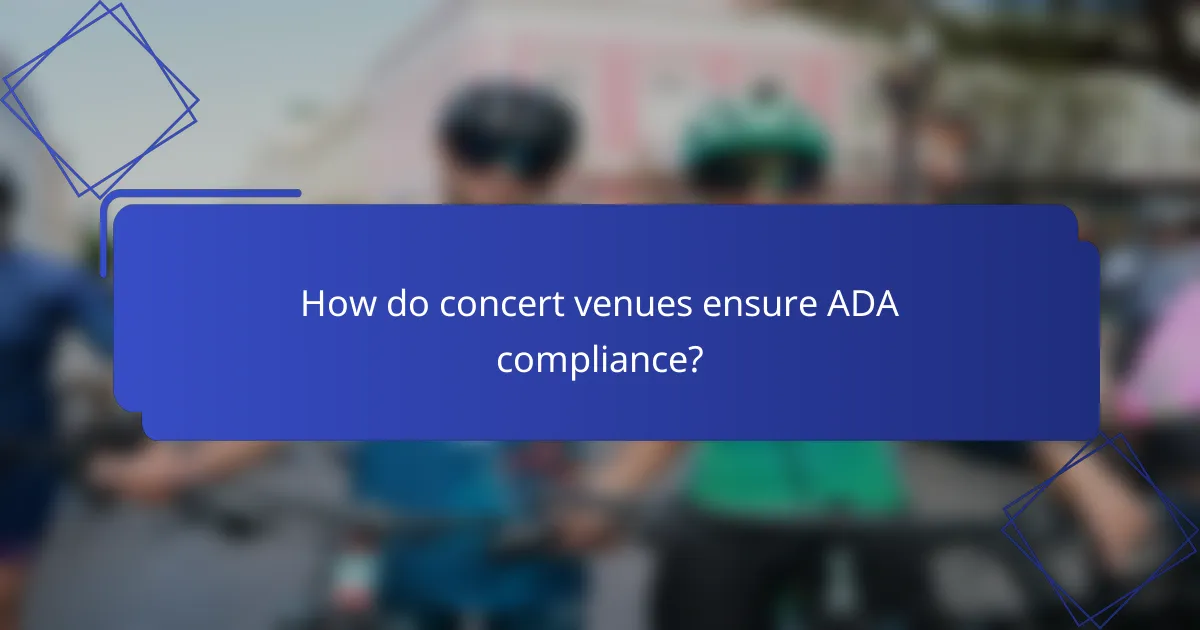
How do concert venues ensure ADA compliance?
Concert venues ensure ADA compliance by implementing a range of facilities and services designed to accommodate individuals with disabilities. This includes physical accessibility features, effective communication methods, and ongoing evaluation of their practices to meet legal standards.
Regular accessibility audits
Regular accessibility audits are essential for concert venues to identify and address any compliance issues with the Americans with Disabilities Act (ADA). These audits typically involve a thorough examination of the venue’s physical layout, seating arrangements, restrooms, and emergency exits.
Venues should conduct these audits at least annually, or whenever significant renovations occur. Engaging third-party accessibility consultants can provide an objective assessment and help ensure that all areas meet or exceed ADA standards.
Staff training on accessibility
Staff training on accessibility is crucial for ensuring that all employees understand how to assist patrons with disabilities effectively. This training should cover topics such as recognizing different types of disabilities, proper use of assistive technologies, and emergency procedures tailored for individuals with mobility or sensory impairments.
Regular refresher courses can help maintain high standards of service. Venues may also consider including people with disabilities in training sessions to provide firsthand insights and enhance staff empathy and understanding.
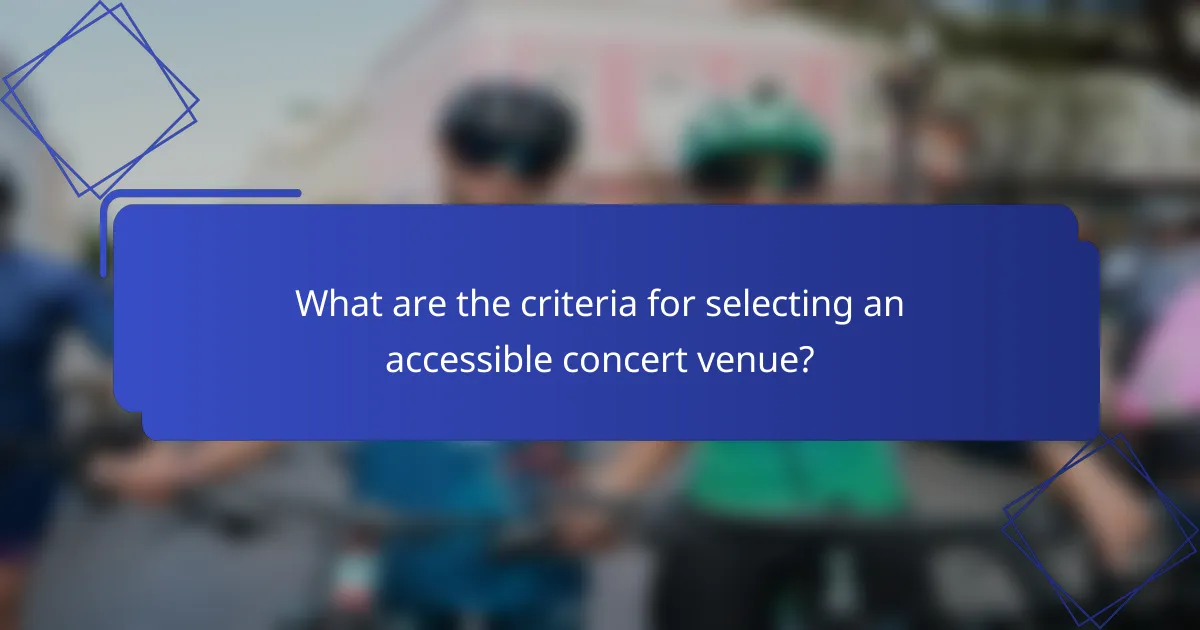
What are the criteria for selecting an accessible concert venue?
When selecting an accessible concert venue, key criteria include physical accessibility, available services, and compliance with relevant regulations. These factors ensure that all attendees, including those with disabilities, can enjoy the event comfortably and safely.
Location and transportation options
The location of a concert venue plays a crucial role in accessibility. It should be situated in an area with easy access to public transportation, such as buses and trains, which are equipped to accommodate individuals with mobility challenges.
Additionally, consider the availability of parking spaces designated for people with disabilities. These spots should be located close to the venue entrance to minimize travel distance. Venues should also provide clear signage to guide attendees from transportation hubs to the venue itself.
Type of events hosted
It is essential to check if the venue offers services such as sign language interpretation, assistive listening devices, or sensory-friendly performances. These services enhance the experience for attendees with specific requirements and demonstrate the venue’s commitment to inclusivity.
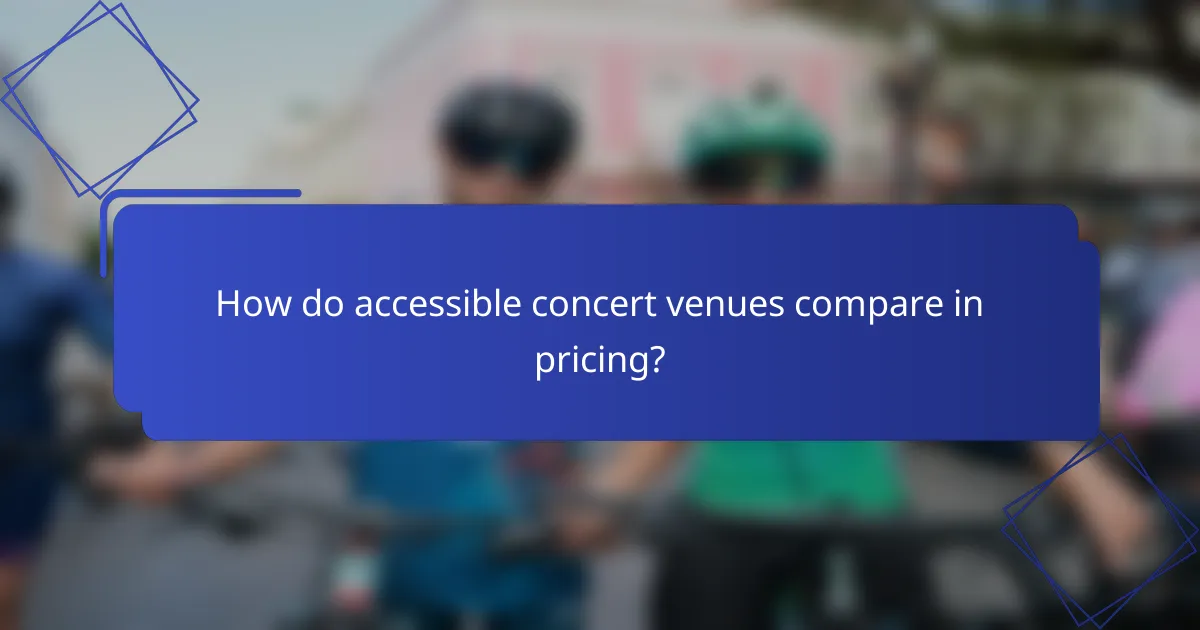
How do accessible concert venues compare in pricing?
Accessible concert venues often have similar pricing to standard venues, but there can be variations based on the specific services and facilities offered. While ticket prices for accessible seating may not differ significantly, additional services can incur extra costs that should be considered when budgeting for an event.
Ticket pricing for accessible seating
Ticket pricing for accessible seating typically aligns with standard ticket prices, ensuring that individuals with disabilities have equal access to events. However, some venues may offer discounted rates for accessible seating, particularly for patrons who require a companion seat. It’s advisable to check with the venue for their specific pricing policies.
Many venues comply with the Americans with Disabilities Act (ADA) or similar regulations, which mandate that accessible seating must be available at all price levels. This means that attendees can expect to find accessible options in various sections of the venue, from general admission to premium seating.
Additional service costs
While ticket prices may be similar, additional service costs can arise for accessible concert venues. Services such as wheelchair rentals, personal assistance, or specialized transportation may incur extra fees. It’s essential to inquire about these costs when planning your visit to avoid unexpected expenses.
Some venues may also offer complimentary services, such as sign language interpreters or assistive listening devices, but availability can vary. Always check in advance to confirm what services are provided and whether there are any associated costs.
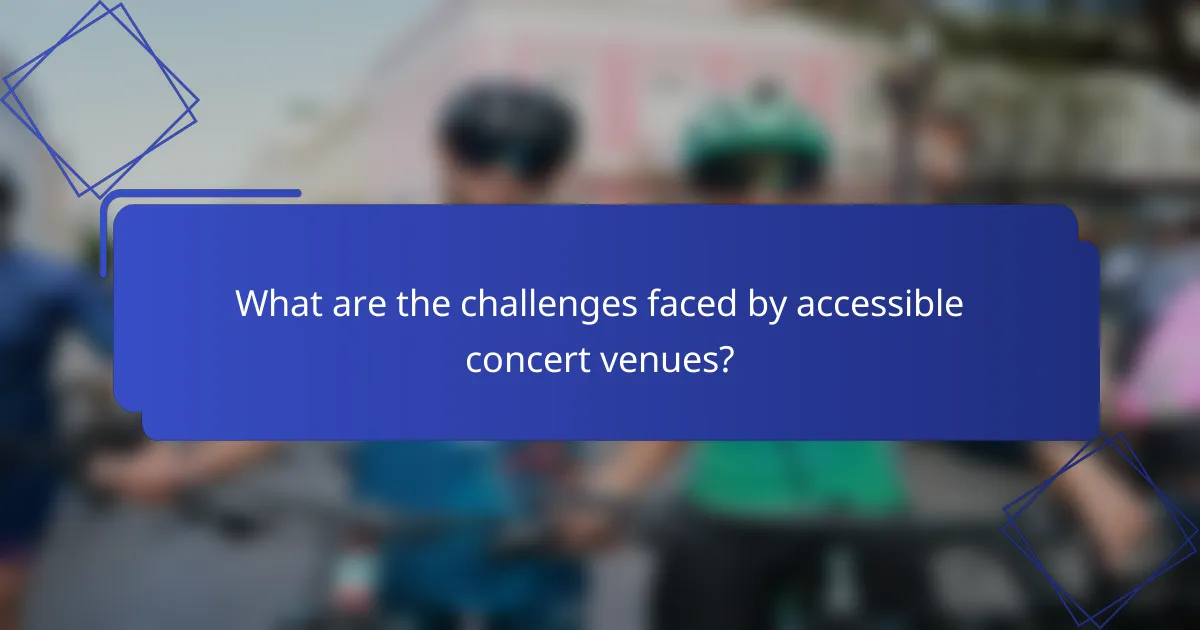
What are the challenges faced by accessible concert venues?
Accessible concert venues often encounter challenges related to funding, awareness, and compliance with regulations. These obstacles can hinder the implementation of necessary facilities and services that ensure inclusivity for all attendees.
Funding for renovations
Securing funding for renovations to improve accessibility can be a significant hurdle for concert venues. Many venues operate on tight budgets, making it difficult to allocate resources for upgrades that meet accessibility standards.
Potential funding sources include government grants, nonprofit organizations, and partnerships with local businesses. Venues should explore these options and consider community fundraising initiatives to support their renovation efforts.
Awareness of accessibility needs
Many venue operators may lack awareness of the specific accessibility needs of individuals with disabilities. This gap can lead to inadequate facilities and services, which ultimately affects the concert experience for these attendees.
To address this, venues should engage with disability advocacy groups to better understand the requirements of their audience. Regular training for staff on accessibility issues can also enhance the overall experience and ensure compliance with regulations.
